| Previous
Page |
PCLinuxOS
Magazine |
PCLinuxOS |
Article List |
Disclaimer |
Next Page |
The Creature Has A New Master... |
|
by Alessandro Ebersol (Agent Smith)  In the week of July 05, 2022, it became public that Lennart Poettering was no longer working for Red Hat, having been hired by Microsoft. Such an event should have no repercussions whatsoever, were it not for who Lennart Poettering is, were Microsoft not the company it is, and were the future of GNU Linux not at stake here. However, such an event has consequences, and let's analyze what should have been done, and what can happen. Poor human resources I teach information security, and one of the subjects is information security in human resources. This discipline teaches us that when an employee is terminated from the company, he/she has to have all credentials revoked, even before leaving the building, to preserve the information security and information assets in the company. What is going on here? The statements that have been made public on the Phoronix website state that Lennart will continue his work as a systemd init developer. Now, from what is publicly available, IBM / Red Hat and Microsoft are rival companies, competitors that offer the same products, and to let an ex-employee go to work at a rival company and continue developing a product that is essential to your company... One has to wonder what his loyalty will be? (but, we all know that people are loyal to those who pay their salaries).  IBM's main rivals However, the consequences get worse. What are the consequences? These events already send shock waves throughout the free software community. And, the consequences are not few. Companies that depend on Free Software Several companies that have GNU/Linux as their main pillar of support or use it as technology are going to be affected by this move. Companies like: Oracle, Suse, Canonical, Amazon, Facebook, just to name a few. Now, where does that leave these companies? Who will determine the course of GNU Linux development is... Microsoft, the company that has always fought against GNU Linux. Who is the cancer now? We must not forget Steve Ballmer's famous quote: Linux is a cancer that attaches a sense of intellectual property to everything it touches. Now the question remains: Who is the cancer now? Because Microsoft is sticking to everything related to Linux, and like a parasite, will control its host (The Last Of Us sends regards). However, it has been some time since Microsoft gave up fighting openly against Linux, and decided to infect it from the inside in order to be better able to erode it, with less resistance and more ease. As Brian Lunduke, in his article Microsoft's growing control of Linux, tells us: Microsoft controls: The largest open source hosting on Earth, a large portion of the Linux conferences, The Linux Foundation, The Open Source Initiative, and prominent Linux developers. (It's not just Lennart who has moved to Microsoft, many open source developers are already working for it: Steve French, Matteo Croce, Matthew Wilcox, Tyler Hicks, Shyam Prasad N, Michael Kelley, Guido Van Rossum, the father of the Python language). The implications As I wrote above, several companies depend on GNU Linux for their business, be it Amazon, Facebook, or any other, and will be affected. But, let's look at some of those involved, and the implications. IBM and Microsoft As I mentioned above, IBM, the parent company of Red Hat, is a competitor of Microsoft. They compete on several products, and as far as I know, and it's public, if IBM is going to let an employee of one of its biggest rivals develop the backbone of one of its biggest products, there's something wrong there. For if there is a tacit or explicit agreement, which the public is unaware of, it is collusion. After all, Lennart's presence at Microsoft, and his salary being paid by Microsoft, is a sign that he will favor the Redmond company. But if he does this, what about the rest of the ecosystem? Free Software Foundation This will be an interesting reaction to see: Over the years, the FSF is always launching campaigns attacking Microsoft and its monopolistic and abusive practices against users. Of course it has never attacked Red Hat (one of the reasons could be that Red Hat has been a sponsor of the FSF for many years...) 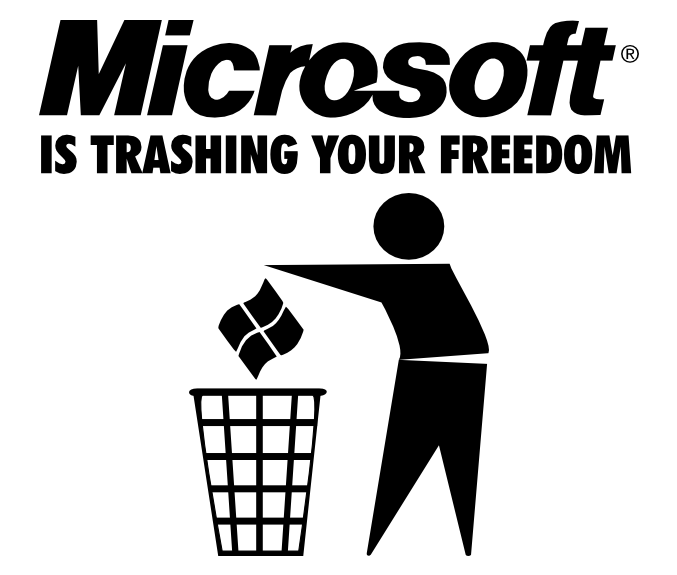 The FSF dedicates a page of its website, to warn users about the dangers of using Microsoft products. And now that systemd will be a Microsoft product? Linux users This is the most fragile and sensitive part, in which I include myself. We depend on Linux for our personal / professional computing, but we have no representation where the decisions happen. But, what could go wrong, now that the systemD will be developed at Microsoft? Everything... Let's see:
Now, the ramifications of the systemd development at Microsoft are obvious: make Linux a client operating system, dependent on windows and unable to run alone on any hardware whatsoever, something like a guest VM, of which windows will be the inescapable host. On the desktop, WSL, for servers, the Azure cloud. But, what's wrong with systemd? Systemd is just software. It does no harm by itself. The problem is the people (and the corporations that control it). Since its creation, from how it was conceived, in 2010, it has, in 12 years, achieved a position of dominance in the Linux ecosystem, where other solutions have taken decades, being improved upon. But, the rush to make systemd a "standard," was, without soft words, a power struggle. A power struggle between Red Hat and Canonical, which also had a solution, Upstart, that competed with systemd. A component that does not do what it should The nature of systemd is so controversial that even it doesn't know what it is. Is it a daemon init manager? Yes, it might be. But, it is not only that. Nowadays, systemd controls too much stuff. So much so, that if compiled properly, 69 binaries are created that control many parts of the system. But why so much power? Power corrupts, and absolute power corrupts absolutely. 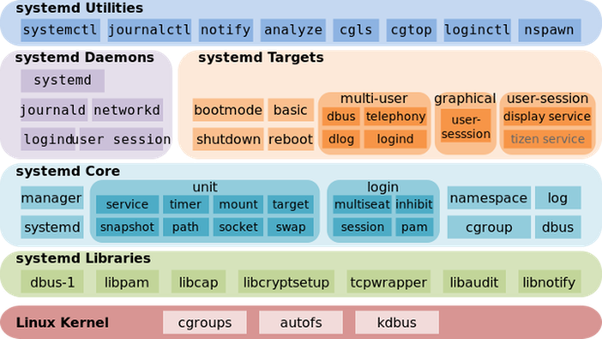 According to several reports, which I could gather from https://www.quora.com, those who had to debug systemd suffered like a stray dog. A developer, who worked with Suse maintaining systemd for Suse Linux, stated: A few years ago, I was working for SUSE Linux Enterprise (SLE) as a full-time developer. My boss asked me if I am interested in maintaining Systemd for SLE. At that time, I knew little about Systemd. So I said, "I'll see what I can do. I downloaded the source code accompanied with more than 2000 backport patches, this took almost half a day. While I was waiting, I reviewed the code and tried to figure out what is in it. And I had contacted several experienced colleagues to learn about it. Finally, I managed to figure out how Systemd takes advantage of Linux Kernel stuff to start services in parallel. This sounds good, but introduces unbelievable complexity for this functionality. If you are an average desktop user, you may rarely encounter problems or can put up with a few bugs in Systemd. But for a corporate version of Linux, it makes the maintainer's job difficult. So much so that I talked to my boss, and I made the case to him that something like systemd needed a small team to maintain. My boss agreed with me and passed the project on to a team. To this day I feel sorry for the poor souls who were left with this task. So something that should be simple becomes complex, hard to understand, and even harder to maintain, since its code is vast (it was at 1.3 million lines of code... just to be a startup system...). And because of this, several problems arise. Mainly being a gigantic piece, opaque and, because of the complexity, obscure. Yes, obscure because of the complexity, and there goes transparency down the drain (and the user's control over the systems he runs on his computer). Ahh, if it were that bad, it wouldn't be the standard in most distros... This is one of the arguments of systemd's defenders. But a half-truth is a complete lie. Continuing on the Quora site, in the research I did in order to write this article, I came across questions about systemd. One of them: Why is Linux switching to systemd when it is so bad? And, there are several such questions on the site. One of the answers, however, caught my eye, because it's the standard response from systemd advocates : "To be fair, the number of users who hate systemd is really just a noisy minority in the Linux community." Now, that is what Red Hat wants everyone to think, that is the official narrative, which they have worked so hard to create and maintain. But, that statement couldn't be more wrong. Most users and professionals are apathetic, that's for sure. Like our whole society is apathetic, and has been for some time. People don't like systemd, but, as it was Red Hat's init, everyone put their heads down and moved on. Actually, those who defend systemd are a noisy minority. And, who knows, very well paid by Red Hat. And, this nature of systemd, supported by narratives created by Red Hat, leads us to its creator, Lennart. And, the choice of Lennart to lead the project was not random. Lennart was chosen precisely because he is... Lennart. The father of systemd: The guy who is never wrong
As I wrote above, Lennart was not chosen by chance. His choice for this project was more for his controversial personality than for his programming talent. Lennart has a tendency to be inflammatory in his comments on social media. So much so that in 2014, he made a post on the late Google+ social network complaining about the Linux community. He discussed how the Linux community in general was a very toxic environment. So much so that he was constantly receiving hate messages and even death threats. In his words "The Linux community is dominated by Western, white, heterosexual men in their 30s and 40s these days. I fit that pattern perfectly, and the garbage they dump on me is horrible. I can only imagine it's much worse for members of minorities, or people from different cultural backgrounds, particularly those where losing face is a major issue." However, he does not cite how he attacked the POSIX standard, the cornerstone of Unix's KISS principle, or how he disregarded compatibility with other open source operating systems (BSD is no longer relevant). He, on the other hand, uses the old tactic of social engineering: victimization. He says what he wants, complains about many things in the development of GNU Linux, and then comes running and says that the community is toxic and that they don't like him. Of course, acting this way, who would like him? Aside from the fact that he does not accept criticism, he always tries to reflect the target of criticism, to another subject. And, for this nonchalant attitude, he won the Pwnie award in 2017 as the worst vendor response of the year. 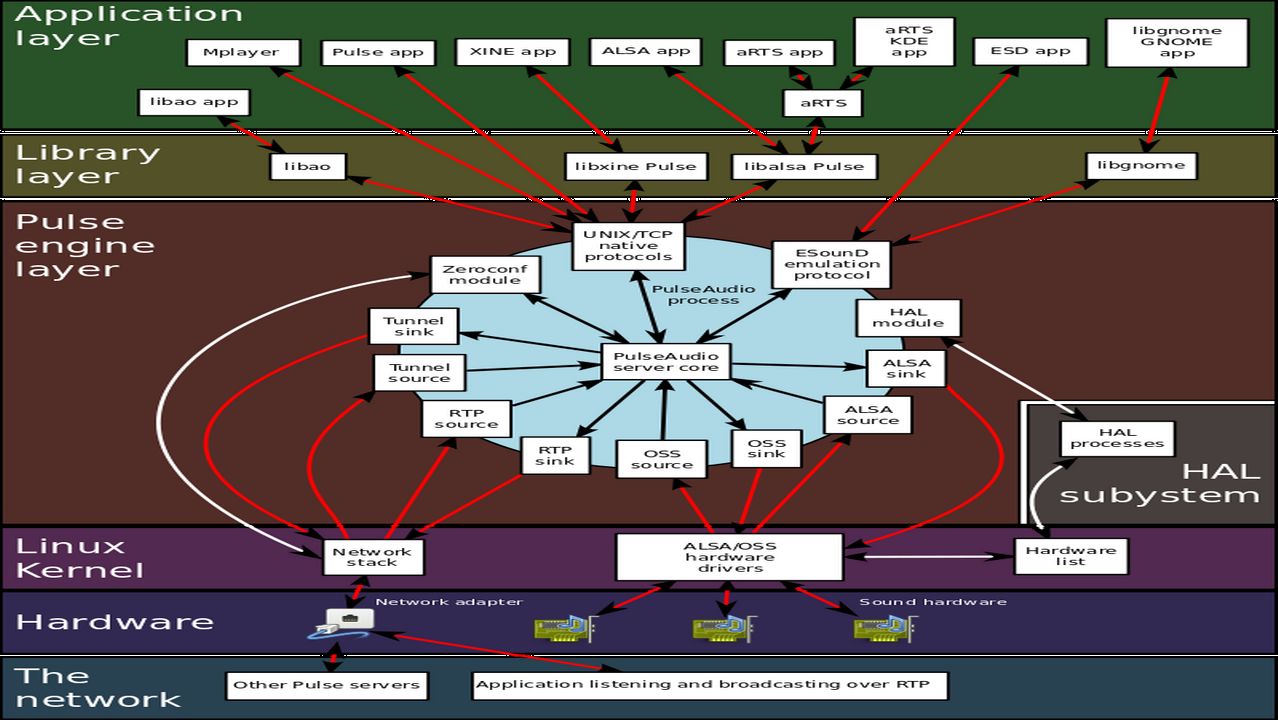 Pulseaudio: The "Lennartix" way of doing things - Spaghetti software Thanks to his way of speaking without restraint, in which he complains about whatever comes to his mind, he was chosen to lead systemd, since criticism of systemd would be reflected in Lennart's persona, and in the heated discussions that followed, over the internet, in forums and mailing lists, the goal would be lost and would turn into personal insults, ad-hominem aggressions, and the focus would no longer be on systemd, but on the people who developed it. And, more social engineering tactics were used, to paint critics of systemd as backwards, dinosaurs who live in the past and can't accept the new. Not to mention an online shock troop that attacked several opponents of systemd, in particular Denis Roio, developer of the Dyne:Bolic distro and one of the creators of the Devuan distro. 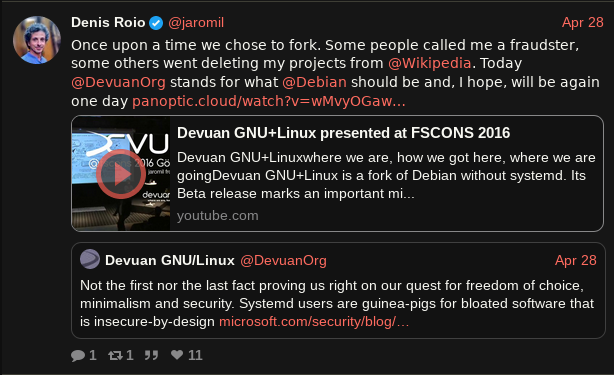 Now, at Microsoft, what to expect from Lennart and systemd? Well, for all his background, it is a wonder that Lennart worked on GNU Linux. In fact, he has always praised the audio and boot systems of other platforms, notably MacOSX and Windows. Most recently, Lennart praised the Windows 11 feature of needing the TPM2 device in order to boot. But back to systemd, at first Lennart modeled it after launchd from MacOSX, but over time it has become something worse, with tentacles in (almost) every part of the system. As one BSD system user commented on the FreeBSD forum https://forums.freebsd.org/, "systemd is really just a poor implementation of launchd. Instead of just coherently merging service-related daemons; it has gone too far with its features and swallowed up most of what runs alongside the GNU userland. Binary logs emulating plists, dbus integration emulating Mach IPC, etc. NIH Linux syndrome at its best. I think the dumbest thing was making Systemd a dependency for gnome-session. That's really how it became a de facto standard." Several developers, who got their start on GNU Linux, actually always wanted to work at Microsoft. One of them was Miguel de Icaza, who has been working at Microsoft since 2016, when his company, Xamarin, was acquired by the Redmond giant. The other was Lennart…  Lennart and his true love And what to expect for GNU Linux? We come to a crucial point here: What can we expect, now that the init system adopted in most Linux distributions, will be developed by a Microsoft employee? Thanks to the various problems brought about by the forced insertion of systemd in several Linux distros, the landscape has become even more fragmented. And because of its complex design, systemd is a nice attack surface for crackers and malware:  Sadly, the whole mess surrounding systemd has served to tarnish the reputation of GNU/Linux. Yes, there is a rebellion against the one-size-fits-all digital tyranny. Add to this the gradual death of several distributions (CentOS, most recently), and you have numbers like below:  In other words, both Red Hat Enterprise Linux and its derivatives are not the preferred distributions of those who use/work with GNU/Linux. In fact, they are used today more for inertia than for their merits. The new projects are all being based on BSD variants: Whatsapp, for example. Another example is Netflix. Another problem, both for systemd and for GNU Linux in general, is that Microsoft is the place where companies / products go to die. Yes, I can list several projects / companies that, after being "touched" by Microsoft, have taken the kiss of death:
Not to mention Github, which, under Microsoft's direction, suffered a mass exodus to other platforms (Gitea, Gitlab, SourceForge, etc…), because Microsoft would abuse the code hosted there (as it ended up abusing). So, I leave the Ned Stark meme to you the reader, and like him, I say: Prepare for impact! 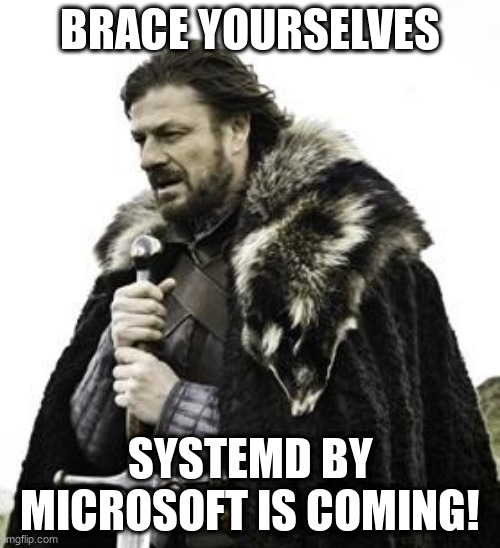 |






